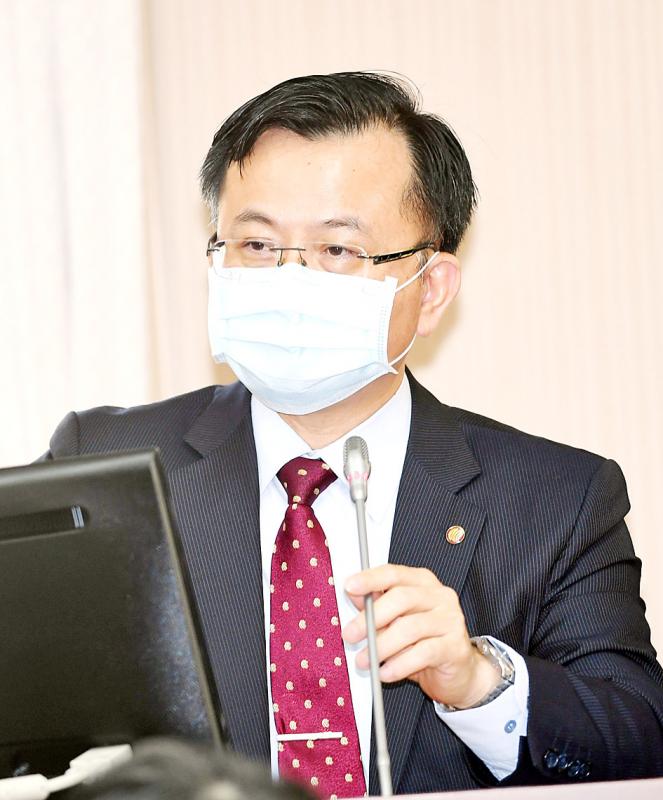A draft digital communications act is to be submitted to the Executive Yuan after division of labor between the National Communications Commission (NCC) and a yet-to-be-established ministry of digital development is ascertained, NCC Chairman Chen Yaw-shyang (陳耀祥) said yesterday.
Chen made the remarks at a meeting of the legislature’s Transportation Committee, at which lawmakers discussed unfreezing part of the commission’s budget.
However, most of the focus was on the commission’s progress in drafting the digital communications bill, which critics say would be how the commission would censor online content.

Photo: CNA
Lawmakers asked how the commission’s activities would change once the new ministry is established, as it would be in charge of developing the telecommunications industry.
“The new ministry is to focus on the development of the nation’s digital industry and is to stipulate an act to facilitate the industry’s growth,” Chen said.
“The NCC is to enforce the digital communications act, which would authorize the commission to oversee online platform operators, which are to be held accountable for the content shown on their platforms,” he said.
The draft law is not designed to censor online content, Chen said, adding that it is impossible to regulate all Internet content.
“The laws that are enforced in the physical world remain effective in the virtual world,” he said. “If the content is about an epidemic, for example, the Ministry of Health and Welfare would review it based on the Communicable Disease Control Act [傳染病防治法].”
The digital communications act, once promulgated, would allow the commission to establish a one-stop service for people to file complaints over online content, he said.
Each case would be relayed to the administrative agency in charge, he said.
“If the complaints were over potentially criminal activity, they would be handled through interdepartmental coordination,” he said.
“If the problematic content originated overseas, the law would authorize the commission and other government agencies to work with overseas partners to address them,” he said.
Large international platforms such as Facebook, Google and YouTube would be asked to participate in a self-regulatory mechanism in Taiwan to address international issues, such as Internet violence and fraud, Chen said.
Lawmakers asked about the commission’s progress in drafting an act governing the management of Internet audiovisual services, which would regulate Netflix, Line TV and other over-the-top (OTT) streaming services.
The commission on May 24 is to hold an interdepartmental meeting to discuss details in the draft OTT act, Chen said, adding that it would hold a public hearing next month.
“We are hoping that we can submit the digital communications and the OTT acts to the Executive Yuan for review during the next legislative session, which begins in September,” he said.

POSITIVE DEVELOPMENT: Japan and the US are expected to hold in-depth discussions on Taiwan-related issues during the meeting next month, Japanese sources said The holding of a Japan-US leaders’ meeting ahead of US President Donald Trump’s visit to China is positive news for Taiwan, former Japan-Taiwan Exchange Association representative Hiroyasu Izumi said yesterday. After the Liberal Democratic Party’s landslide victory in Japan’s House of Representatives election, Japanese Prime Minister Sanae Takaichi is scheduled to visit the US next month, where she is to meet with Trump ahead of the US president’s planned visit to China from March 31 to April 2 for a meeting with Chinese President Xi Jinping (習近平). Japan and the US are expected to hold in-depth discussions on Taiwan-related issues during the

‘LIKE-MINDED PARTNER’: Tako van Popta said it would be inappropriate to delay signing the deal with Taiwan because of China, adding he would promote the issue Canadian senators have stressed Taiwan’s importance for international trade and expressed enthusiasm for ensuring the Taiwan-Canada trade cooperation framework agreement is implemented this year. Representative to Canada Harry Tseng (曾厚仁) in an interview with the Central News Agency (CNA) said he was increasingly uneasy about Ottawa’s delays in signing the agreement, especially as Ottawa has warmed toward Beijing. There are “no negotiations left. Not only [is it] initialed, we have three versions of the text ready: English, French and Mandarin,” Tseng said. “That tells you how close we are to the final signature.” Tseng said that he hoped Canadian Prime Minister Mark Carney

President William Lai (賴清德) yesterday bestowed one of Taiwan’s highest honors on Saint Vincent and the Grenadines (SVG) Ambassador Andrea Clare Bowman in recognition of her contributions to bilateral ties. “By conferring the Order of Brilliant Star with Grand Cordon on Ambassador Bowman today, I want to sincerely thank her, on behalf of the Taiwanese people, for her outstanding contribution to deepening diplomatic ties between Taiwan and SVG,” Lai said at a ceremony held at the Presidential Office in Taipei. He noted that Bowman became SVG’s first ambassador to Taiwan in 2019 and

A man walks past elementary school artworks at the Taipei Lantern Festival in Ximen District yesterday, the first day of the event. The festival is to run from 5pm to 10pm through March 15.